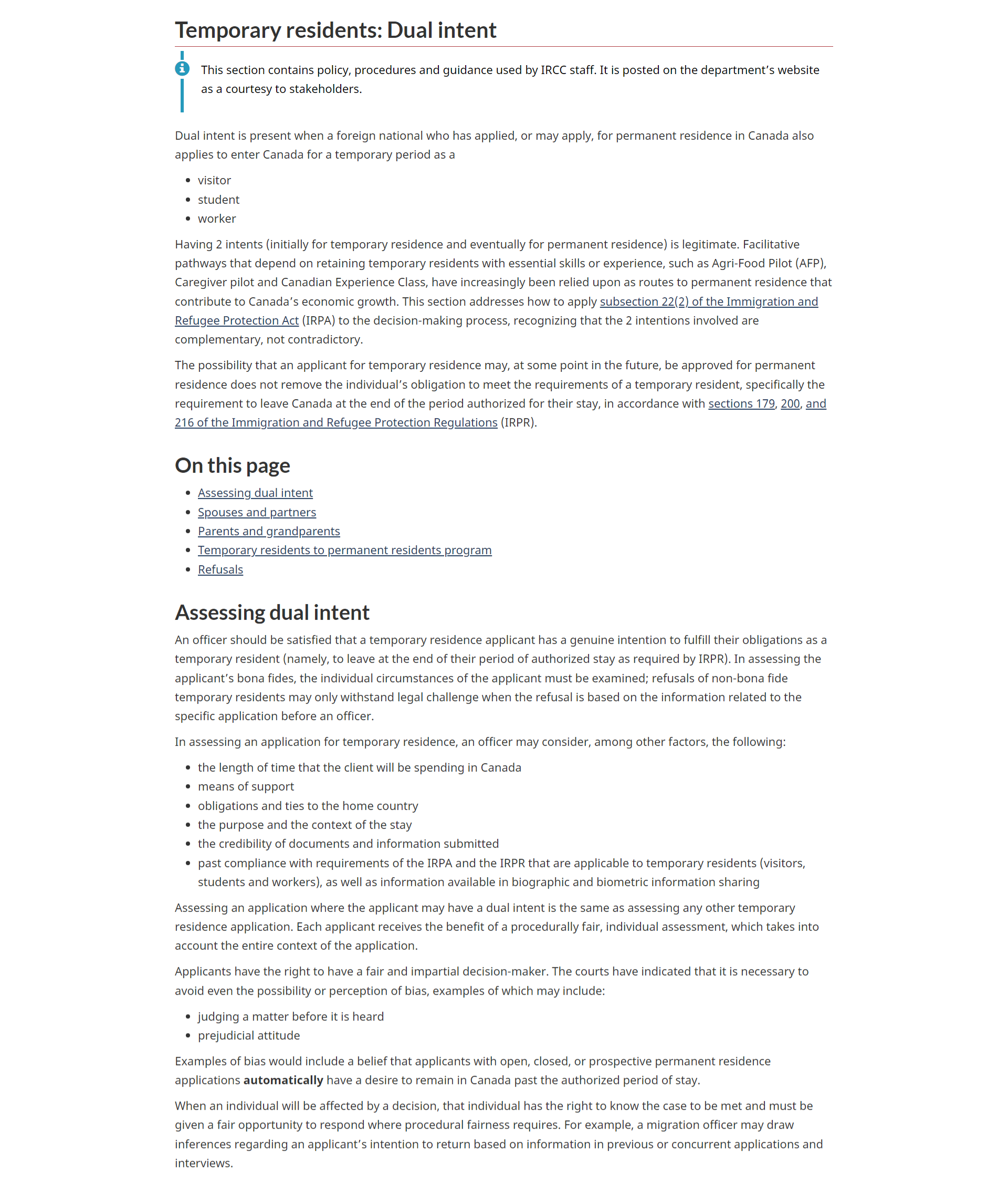

New Policy: IRCC Acknowledges that Having Dual Intent is Recognized as a Legitimate Circumstance.
“Dual intent” refers to the situation where a foreign national intends to enter Canada temporarily as a visitor, student, or worker, but also has the intention to apply for permanent residence in Canada, either before or after entering the country.
In other words, dual intent is present when a foreign national has applied or may apply for permanent residence in Canada, but also wishes to enter Canada temporarily for work, study, or tourism. This allows the foreign national to pursue both temporary and permanent residence status in Canada simultaneously, without one application affecting the other.


On April 5th, Immigration, Refugees and Citizenship Canada (IRCC) updated its program instructions for IRCC staff regarding cases of dual intent. The revised instructions now acknowledge that having two intentions – initially for temporary residence and eventually for permanent residence – is legitimate and complementary, rather than contradictory.
The updated instructions emphasize that the legitimacy of dual intent should be considered when applying subsection 22(2) of the Immigration and Refugee Protection Act (IRPA) to the decision-making process. Subsection 22(2) states that a foreign national’s intention to become a permanent resident does not automatically preclude them from being granted temporary resident status, as long as the IRCC officer is satisfied that the individual will leave Canada at the end of their authorized stay.
Overall, the updated instructions provide a more flexible and inclusive approach to immigration, allowing individuals to pursue both temporary and permanent residency in Canada simultaneously, as long as they meet the requirements set out in IRPA and other applicable regulations.
The updated instructions also contain a section on Temporary Resident to Permanent Resident Programs, which reminds IRCC officers that Canada actively promotes these programs to foreign nationals, and that Canadian work experience is crucial for successful settlement.
Facilitative pathways that rely on attracting temporary residents with essential skills or experience, such as the Caregiver Pilot, the Canadian Experience Class, and the Agri-Food Pilot, have become increasingly important routes to permanent residence. Other programs award extra points to applicants whose work or study experience is in Canada.
Regarding study permit applications, officers must take into consideration that Canada actively promotes study-work permanent residence pathways to prospective students. These students are encouraged to indicate that they wish to immigrate to Canada permanently, and officers must consider this when processing their applications.
How IRCC officers assess dual intent
In order to approve a temporary resident application, the IRCC officer must be convinced that the applicant has a genuine intention to leave Canada at the end of their authorized stay. To assess this, the officer must carefully examine the individual circumstances of the applicant. Some of the factors that may be taken into account, among others, include:
On the other words:
By assessing these and other relevant factors, the officer can determine whether the applicant has a genuine intention to leave Canada at the end of their authorized stay, or if they pose a risk of overstaying their visa and remaining in Canada illegally.
The instructions clearly state that the assessment of an application in cases where an applicant has dual intent should be conducted in the same manner as the assessment of any other temporary residence application. Every applicant is entitled to receive the benefit of a procedurally fair and individual assessment, taking into account the entire context of their application.
Page: 1 2
What are the requirements for becoming a Canadian citizen? To become a Canadian citizen, you…
Writing a letter of invitation doesn’t mean you’re legally responsible for the visitor once they…
As of January 28, 2025, Immigration, Refugees and Citizenship Canada (IRCC) has updated the health…
The Super Visa is a multiple-entry temporary resident visa (TRV), issued with a validity of…
The Super Visa is a multiple-entry temporary resident visa (TRV), issued with a validity of…
If you applied for a new temporary resident visa, or a study or temporary work…